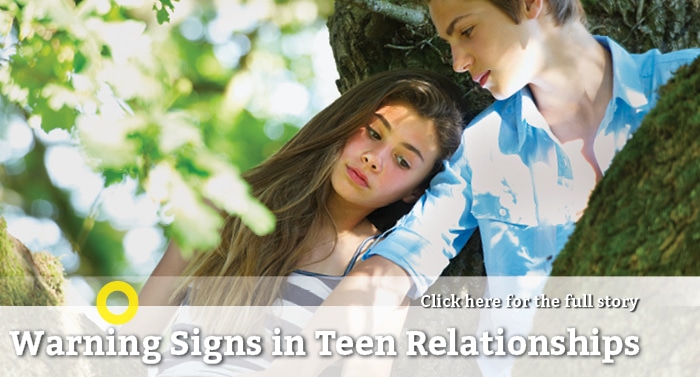By Michael Klinkner, Licensed Clinical Social Worker
A 2017 survey found 60% of teens had experienced verbal, emotional or physical violence in a dating relationship. Abusive teen relationships can lead to a host of issues like poor academic performance, binge drinking and substance abuse, suicide attempts, negative body image and low self-esteem. It can also set the stage for violence in future relationships.
As parents, we want what is best for our teens. As they enter dating relationships, the goal should be to have age-appropriate fun and spend time with people who will help them grow as humans. However, sometimes teens end up in relationships with people who are not good for them. As parents, it’s hard to determine when to get involved, especially since the signs of dating abuse can be very subtle.
Signs your teen is in a toxic or abusive relationship:
- Do they have a partner who is extremely jealous or possessive, constantly puts them down or insists on making all the decisions in the relationship?
- Has your teen stopped spending time with friends or family? Have they given up favorite hobbies or activities?
- Do they have unexplained marks or bruises?
- Does your teen seem overly anxious or have their grades have dropped?
- Are they dressing differently to hide their body?
- Do they constantly check in with their partner and return messages right away?
- Do they worry about how their partner will react in various situations?
- Do they make excuses for their partner’s behavior?
While it’s tempting to jump in and try to fix the situation, your teen may react negatively if you push too hard too soon. But you can help if you suspect your child is in an abusive relationship.
Here are a few ways to help your teen open up about their relationship:
Be prepared. Do your research about the qualities of healthy and unhealthy relationships. Help your child spot unhealthy or abusive behaviors in his or her relationship. Even if they aren’t ready to leave the partner, planting the seeds that a relationship is unhealthy is critical.
Find the right venue. Setting a scheduled meeting to have a talk can be intimidating. Instead, bring the subject up at a comfortable time, such as in a coffee shop, while watching TV or driving in the car. A casual setting will make your teen feel more at ease and more willing to confide in you. Keep in mind this is not a one-and-done conversation. These conversations will build over time. While you may want a quick fix, helping your child realize they are in a dysfunctional relationship needs to happen on their terms.
Tell your child what you see. Gently point out things you have noticed that are concerning. For example, “I’ve noticed you seem quiet lately. Is anything going on?” Or “Lately, your grades have been slipping. Is there anything you’d like to talk about?”
Listen calmly and without judgment. Let your teen take the lead in the conversation. It takes courage for them to tell you what’s going on. They may feel ashamed about the situation they find themselves in. It is important that you stress they have done nothing to deserve abuse.
Focus on the behaviors, not the person. Your child may not be ready to hear their partner isn’t a good choice. But, speaking critically about the partner may push your child further away. Instead of focusing on the partner as a person, put the emphasis on the inappropriate actions. For instance, instead of saying, “He’s controlling,” say, “I don’t like that he doesn’t let you play in your band anymore.”
Create a plan of action. Ask your child what they think the next step should be. If it’s to leave the relationship, make sure they have a safety plan in place. If your child’s partner is at the same school, speak to the guidance counselor or advisor to make sure everyone stays safe.
Michael Klinkner is a Licensed Clinical Social Worker who specializes in Cognitive Behavioral Therapy, Dialectical Behavioral Therapy and Neurolinguistic Programming. He is also certified in Eye Movement Desensitization and Reprocessing. Klinkner provides individual, group and family therapy to children, adolescents and adults in Central Phoenix and Gilbert, Ariz. Klinkner focuses on treating a variety of mental health issues, including anxiety, depression, trauma and ADHD. For more information, visit https://www.facebook.com/michaelklinknercounseling/ or https://instagram.com/michael_klinknercounseling
Read more by Michael Klinkner:

